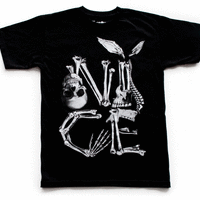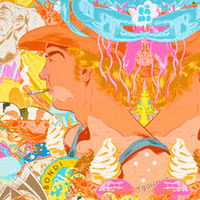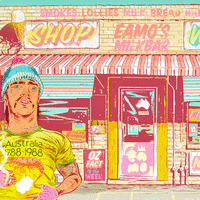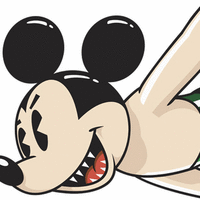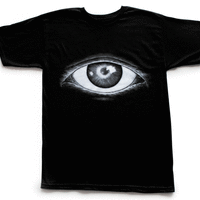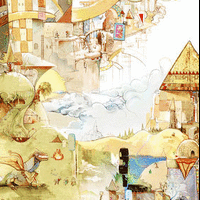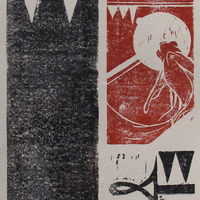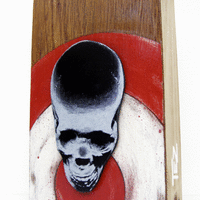LTRHDS Interview – Graeme Base – The Letter A.
 The first in a series of 26 interviews with the LTRHDS exhibition artists.
The first in a series of 26 interviews with the LTRHDS exhibition artists.
Writer Anthony Costa sat down with the legendary children book illustrator Graeme Base in his Melbourne studio/home. Base is the author of such classics as The Eleventh Hour and the alphabet based Animalia. For most of us Animalia was one of our earliest introductions to art, so it’s fitting that Graeme kick starts the LTRHDS interview series. During the next few weeks we’ll also be featuring artists such as KR, Anthony Lister, SheOne, Mark Bode, Kami and Usugrow. For the full lineup check www.LTRHDS.com
the recording of the interview.
.

What was your own childhood like? Do you have any vivid memories or growing up in England?
 I moved to Australia at the age of eight. Up until then, very ordinary British childhood, if there is such a thing. The only thing of note was the very last school report I received – I was all of seven years old – which said, and I can remember it by heart, ‘Graeme is a born leader of the other children. Unfortunately, usually in the wrong direction’. Which I think summed up that I was in need of a change.
I moved to Australia at the age of eight. Up until then, very ordinary British childhood, if there is such a thing. The only thing of note was the very last school report I received – I was all of seven years old – which said, and I can remember it by heart, ‘Graeme is a born leader of the other children. Unfortunately, usually in the wrong direction’. Which I think summed up that I was in need of a change.
And when mum and dad came out from England it was a massive change because I was suddenly in a tough Aussie state school and I was this little English pommy kid with a funny accent… still got it now but it was funnier at the time, I can assure you. I didn’t know the schoolyard games, and I used to get into fights. Had a funny name too: Base, what kind of a surname is that?
So I was always getting into trouble. But the main thing was I realized I needed to find my area of strength. I was no longer a leader in any sense of anybody, not that I ever aspired to be anyway. But I figured out pretty quickly that the thing I could do was draw.
So very early on, I began to concentrate on that, becoming ‘the kid who drew.’ I did very good stuff in art and I would gain some kudos through that. If somebody was working on a project and they needed a flash heading for their geography assignment I’d do it for them…
Did you always know that art was what you wanted to devote your life to?
From the earliest age… certainly by the time I was ten or eleven.
And then you became an artist. But it wasn’t easy… Animalia took you three years. How did you get through that?
 There was a stage in-between. All of my young life I said I wanted to be an artist, and then I went to Swinburne Institute of Technology as it was then and did a graphic design course. After that I did what was expected, which was getting a job in advertising. That’s when the wheels fell off. It was awful.
There was a stage in-between. All of my young life I said I wanted to be an artist, and then I went to Swinburne Institute of Technology as it was then and did a graphic design course. After that I did what was expected, which was getting a job in advertising. That’s when the wheels fell off. It was awful.
I was being a commercial artist, which is what I thought I wanted to do, but I couldn’t bear it because it was so non-creative. And I very quickly fell foul of the system. I went through three jobs. Didn’t last for more than a few months in any of them, and got fired from the third one… thank God! I just needed to get out.
I was moonlighting, doing book jackets and occasional bits of illustration for some publishers… I’d just been doing that for sanity’s sake, in the evenings and weekends. So I took my folio around to publishers with an idea for a book… it was a book on dragons, which eventually got published much later.
One of them said to me, ‘We like your work, why don’t you do something with an Australian flavor?’, and that resulted in a book called My Grandma Lived in Gooligulch. That was actually the first book that I wrote and illustrated. It didn’t pay the rent but it was so much more enjoyable than doing advertising work. And wow, I was published! That was a huge breakthrough for a very young artist.
The next book was Animalia. Even before Gooligulch was published I’d begun working on it, and I went back to the same publisher… I showed them the H page, The Hairy Hogs, and I said, ‘Look, I think this is the first page in an alphabet book. It’s going to take me a little while to finish!… What do you think? They said, ‘We love it, go for it’, and they managed to drum up an advance through Penguin locally, and they managed to sell it to an American publisher about a year into the project.
That’s how I managed to get through the three years in the end… Bob Sessions – who was this publisher who was eventually taken over by Penguin books – backed me to an extant that was unusual at the time… it was an advance of about $10,000 which was really significant then. So that allowed me to get through… and also my wife Robyn was working as an emergency teacher. She’s an artist in her own right but she was teaching at the time, albeit here and there.
The two of us were in a band together at the time too. She was the lead singer and I was the drummer, and we were spending most of our time playing gigs and trying to make that all work. That was a way of spending money, not making money! Interesting times… they were happy, but poor!

You’ve described yourself as being a bit of a Peter Pan figure. How do you keep yourself thinking young? How do you stave off the cynicism and know-it-all conceit that comes with adulthood?
Who says I have! I’m fairly cynical now having reached my fifties! Ha. No… I think this is a job that does keep you thinking young. You have to. That’s not such a hard thing to achieve, depending on who you are. I actually have a friend who feels that he has been fully grown up since he was eighteen. Absolutely an adult man.
Poor guy!
 Yeah, that’s what I thought too. He had his reasons for that. But I feel the opposite. As a fully grown man I sometimes feel like a child. But I suppose that can be a good thing when it’s kept in balance, where the right parts emerge at the right time. I’d draw a difference between childish and child-like. Childish, usually not good. Child-like, something to be aspired to in a lot of respects, such as having wonder in the world, amusement, humor, stuff like that.
Yeah, that’s what I thought too. He had his reasons for that. But I feel the opposite. As a fully grown man I sometimes feel like a child. But I suppose that can be a good thing when it’s kept in balance, where the right parts emerge at the right time. I’d draw a difference between childish and child-like. Childish, usually not good. Child-like, something to be aspired to in a lot of respects, such as having wonder in the world, amusement, humor, stuff like that.
But the books that I do and my artwork comes from two sources, both the adult and child within. Different layers can be attributed to those different sources. There will be a level at which a very young child can enjoy a book like Animalia just by saying, ‘Look, it’s a cat!’ Then a slightly older child will be read to, read the alliterations and enjoy the poetry of it.
And then older ones again will look at some of the more challenging ones like the V page and begin to wonder what the words actually mean. Some adults might too! V page by the way would ever get published now I think. It’s a sign of a growing conservatism.

That’s an interesting point. Do you sense that kid’s entertainment is becoming increasingly bland and innocuous, and that childhood is being turned into this safe and cuddly thing that it perhaps never was?
Well there’s an economic imperative towards that. It happens in Hollywood too. It happens in perhaps every field of endeavor where the people with the money tend to not want to loose it, so they want more of the same and veer towards conservatism. It certainly is happening in the children’s book industry.
 As I say, the V page, which is, ‘Victor V Vulture the vaudeville ventriloquist, versatile virtuoso of vociferous verbosity..’, etc etc… At the time the publisher said, ‘Are you really sure? It’s a little bit long!’ And I quoted the made up word from Mary Poppins: Super-cali-fragilistic-expi-ali-docius. Sure, it could have been shorter. It wouldn’t be half as funny or as memorable.
As I say, the V page, which is, ‘Victor V Vulture the vaudeville ventriloquist, versatile virtuoso of vociferous verbosity..’, etc etc… At the time the publisher said, ‘Are you really sure? It’s a little bit long!’ And I quoted the made up word from Mary Poppins: Super-cali-fragilistic-expi-ali-docius. Sure, it could have been shorter. It wouldn’t be half as funny or as memorable.
For goodness sake, in the end, if you don’t know what ‘vexatious’ or ‘vociferous’ means, go and find out! There’s an educational level to it too. So it got through. But I suspect now that the bean counters and stuff would probably hold sway. Even the whole concept of an alphabet book… they would have done their market research: ‘Does the world really need another English language alphabet book? Hmmmmmmm…. dunno?… How are you going to do x?’… no one even asked me that! I didn’t know, right up until the last six months of the project. It was my mother who suggested I do it as a mirror image, having everything end in X. So I sort of fudged it. It was a simpler age, let me say.
But the layering… an adult could look at Animalia or any of my books and find something that works at their level, but not at the expense of the child. I don’t find that balance hard to maintain. I guess it’s just the sort of person I am.
Animalia, and your later works The Water Hole and Uno’s Garden all feature a strong love of nature. Do you think that we as adults will be capable of cleaning up our own mess or will it require a new generation, the kids of today to restore our environment?
 Well, we’re the kids of yesterday… and the kids of today will be the adults of tomorrow… I’m not going to take that any further or else it will just get confusing! But I suppose, look… my default position in life is one of cautious optimism. That we have the ingenuity as a species to create, to invent, to come up with ideas… it’s happening all the time.
Well, we’re the kids of yesterday… and the kids of today will be the adults of tomorrow… I’m not going to take that any further or else it will just get confusing! But I suppose, look… my default position in life is one of cautious optimism. That we have the ingenuity as a species to create, to invent, to come up with ideas… it’s happening all the time.
Right now we obviously need to do it in a big way, but you could have said that back when we were kids. And we may have the luxury of being able to say that when our kids have their own children. I don’t know how desperate the situation really is. Nobody quite knows. A lot of people are very well informed, a lot of people are ill informed. The books like Uno’s Garden importantly are to do with hope and optimism, because if you don’t have that you don’t even try. I would not create a book that said, ‘Uuugh, we’re all doomed, look what we’ve done to the planet, oh God what now.’ Uno’s Garden is about regeneration.
The first half of the book shows what can happen when you get it all wrong. Uno, our hero, dies…. you should have seen us trying to get that through past the publisher! ‘WHAT, he dies!!! How could you do that!!’ But I said, ‘No, he has to.’ Because the next part of the book is the crucial part where, yeah, we all die… but now is where the real work begins, when you get to that dark place in any story, real or imaginary, and move back to the light.
So I guess I have in recent books acknowledged and taken up the realisation that as a parent I can have a very big effect on a very small amount of kids – my own. As a teacher, if I were one, I could have a slightly lesser effect on slightly more children. As an illustrator or author I can have a very small effect on a million kids. That’s something you can do something with.
A book like Uno’s Garden is a tiny part of their lives… and the strike rate, may be one in ten, maybe one in a hundred, maybe less, maybe more. But whatever it is, if I can talk about this fragile environment, if they’re aware of the metaphor, if they’re given the sense that they can do something about it, then the book has been more worthwhile then if it were just entertainment. There’s nothing wrong with entertainment… it is enough.
But if you can do more, why wouldn’t you?
Graeme Base will be re-interpreting the Letter A, as part of the 26 artist alphabet LTDHDS exhibition, on display in Melbourne and Sydney is 2010. Click here for more details. www.LTRHDS.com

Blast Off! From The Worst Band in the Universe
Ngiri in the Jungle
Four Snow Leopards Gazing at the Water Hole
One Rhino Drinking at the Water Hole
The Emus
Images care of www.graemebase.com


